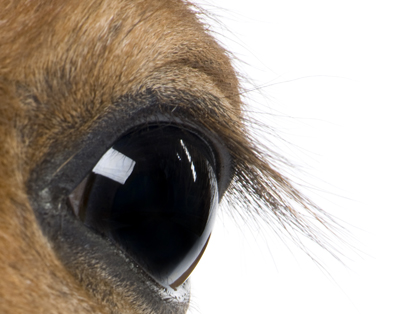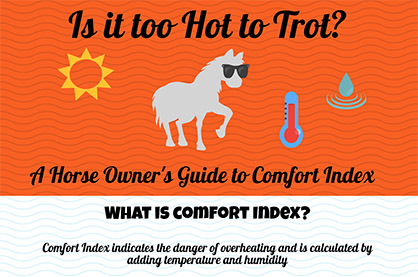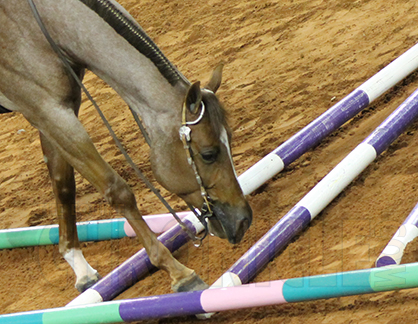Behavioral and Physiological Responses of Therapy Horses to Mentally Traumatized Humans
June 5, 2018 Comments Off on Behavioral and Physiological Responses of Therapy Horses to Mentally Traumatized Humans
The project also indicated: 1) Therapy horses do not differentiate between humans with PTSD and those without. 2) Therapy horses display more stress behaviors when they are alone in a round pen. 3) Therapy horses are more attentive to humans who are experienced around horses. 4) Therapy horses are calmer with humans who are inexperienced around horses.
Continue reading …Home Away From Home- Preparing a Stall at Horse Shows
June 5, 2018 Comments Off on Home Away From Home- Preparing a Stall at Horse Shows
Then use an equine safe disinfectant to kill any pathogens that may have been left behind. Even at facilities which remove the bedding and manure, it’s a good idea to disinfect the stall before your horse enters.
Continue reading …
As temperatures continue to rise into the triple digits this summer, riders need to be mindful of how the extra heat may be affecting their beloved equine partners. But did you know that temperature doesn’t show the whole story? It’s important to take humidity into the equation.
Continue reading …Learn Mountain Horsemanship and Track Mustangs by Horsepacking in the High Sierra and Inyo National Forest
June 2, 2018 Comments Off on Learn Mountain Horsemanship and Track Mustangs by Horsepacking in the High Sierra and Inyo National Forest
Track wild mustangs in the barren and remote high desert area of Pizona in Inyo National Forest, which plays host to North America’s wildest bands of mustangs. Observe free-roaming herds, blooming wildflowers and other resident wildlife, and learn about the history, social behavior and uncertain future of these proud animals.
Continue reading …6 Tips For Giving Oral Reasons For Horse Judging Beginners
May 31, 2018 Comments Off on 6 Tips For Giving Oral Reasons For Horse Judging Beginners
Tip #4- After judging a class, most of the time your first instinct is to go to work writing out your reasons. However, this is doing yourself a huge disservice. Writing out your reasons forces your brain to remember the piece of paper, not the horses. If you get stuck in the reasons room, you’ll have a harder time trying to remember what you were trying to say. Instead, jot down a few key words or bullets and refer to those when practicing, not your whole notes page.
Continue reading …Horse Trailer Flooring- Pros and Cons of Different Types
May 30, 2018 Comments Off on Horse Trailer Flooring- Pros and Cons of Different Types
Aluminum corrodes. Alkaline in urine and manure is the biggest culprit. An aluminum floor has to be washed with soap and water often to deter corrosion. Without cleaning, certain aluminum floors can fail in about eight years or less.
Continue reading …Identifying Primary, Secondary Pain Sources in Horses
May 26, 2018 Comments Off on Identifying Primary, Secondary Pain Sources in Horses
Among the diagnostic points covered are the necessity for a ‘whole horse’ evaluation that includes assessing range of motion in hand and under saddle on hard and soft surfaces, palpation of tendons and soft tissue, muscular symmetry (atrophy vs. development), flexion tests, way of going through the gaits on straight lines and circles, on contact and a long rein, and overall fit of the girth and saddle.
Continue reading …Fighting Fly Allergies and Mosquito Borne Diseases
May 23, 2018 Comments Off on Fighting Fly Allergies and Mosquito Borne Diseases
In a horse affected by sweet itch however, the immune system overreacts and the horse exhibits a type one hypersensitivity reaction, resulting in the release of histamine. Histamine causes intense itching and swelling at the site of the bite, making the horse rub and scratch, leading to skin damage and possible infection.
Continue reading …APHA Horse IQ Video Learning Now Includes Hunt Seat Equitation
May 23, 2018 Comments Off on APHA Horse IQ Video Learning Now Includes Hunt Seat Equitation
New to the HorseIQ Library are hunt-seat equitation pattern videos from the 2017 APHA World Championship Show. Use these runs to enhance your understanding of the class judging priorities and scoring system, practice judging and scoring runs, and to understand the nuances that compile to create a winning performance. In addition to the entire slate of class performances from the 2017 Classic Amateur Hunt-Seat Equitation class, find links to a blank scorecard, the pattern description and judges’ official scorecards.
Continue reading …Feeding the Fat Horse: Achieving Better Body Condition Through Nutrition
May 22, 2018 Comments Off on Feeding the Fat Horse: Achieving Better Body Condition Through Nutrition
Excess weight may cause or predispose horses to problems like joint pain, laminitis and insulin resistance, or it may indicate an existing metabolic disorder. Nutritional management of the overweight horse is key – and not quite as simple as some may think.
Continue reading …







